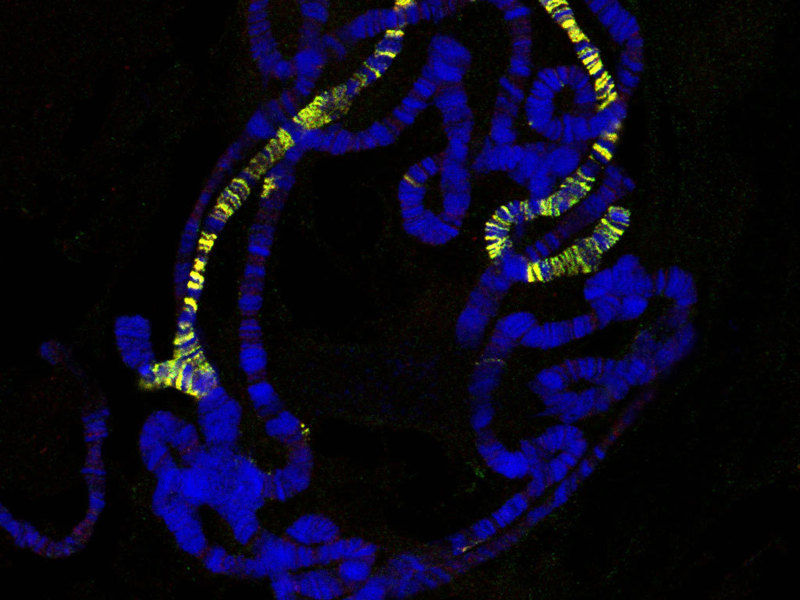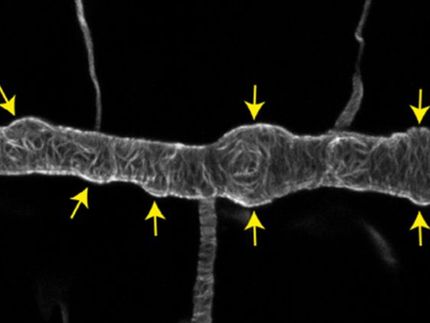Dosage compensation in male flies: Balance between sexes
Fruit flies make up for the imbalance in the number of X chromosomes between the sexes at the start of transcription
The sex of many organisms is determined by the number of X chromosomes. In humans, for example, women have two X chromosomes, whereas men have only one X chromosome, but also have an additional Y chromosome. The same is true of other mammals, and of fruit flies, as well. Why this does not result in an imbalance in the expression of important genes on the X chromosome is what Asifa Akhtar and her colleagues from the Max Planck Institute of Immunobiology and Epigenetics in Freiburg have examined in collaboration with Nicholas Luscombe’s laboratory at the European Bioinformatics Institute in Cambridge, UK. They have been able to show, for the first time, that the initiation phase of mRNA synthesis is triggered in male fruit flies to make up for this imbalance.

Chromosomal spreads from salivary glands of male larvae. The X chromosome is decorated by the MSL complex (in yellow), the other chromosomes can be seen in blue.
© Thomas Conrad
Most organisms have developed a strategy for making sure that the X chromosomal genes, which are important for both sexes, are properly transcribed. The strategy is known as dosage compensation. Whereas mammals compensate by inactivating one of the two X chromosomes in females, what happens in fruit flies is that the genes on the X chromosomes of the males are doubly expressed. This is done by means of the dosage compensation complex, which reduces the tightness of the male X chromosome’s packaging, thereby making it especially easy for transcription factors to access. However, how exactly this change in the chromatin structure facilitates the expression of X chromosomal genes by just a factor of two remains poorly understood.
A team effort combining carefully designed experiments from the graduate student Thomas Conrad (Akhtar lab) and detail bioinformatics analysis performed by graduate student Florence Cavalli and postdoc Juan Vaquerizas (Luscombe lab) was crucial in obtaining fundamental insights into how expression is doubled in males.
Gene transcription begins with the enzyme RNA polymerase II, which binds to the promoter of a DNA string and thus transcribes the genetic information from it. The scientists at the Max Planck Institute of Immunobiology and Epigenetics have now shown that the crucial factor in the double expression is the amount of polymerase II that is loaded onto the promoters of the male X chromosome. “The more polymerase II that binds to the promoter, the higher the frequency of transcription,” explains Akhtar. The key step therefore takes place in the so-called initiation phase.
The scientists are therefore the first to have demonstrated why genes on the X chromosome in male fruit flies are transcribed more than their female counterpart. In so doing, they have gained an insight into the fundamental interaction between DNA structure and gene expression. “We are now excited to further investigate how loading twice the amount of polymerase leads to doubling expression of the male X chromosome” says Akhtar.
Original publication
Conrad, Cavalli, Vaquerizas, Luscombe, Akthar; Drosophila dosage compensation involves enhanced POL II recruitment to male X-linked promotors; Science, 19th July 2012
Original publication
Conrad, Cavalli, Vaquerizas, Luscombe, Akthar; Drosophila dosage compensation involves enhanced POL II recruitment to male X-linked promotors; Science, 19th July 2012
Organizations
Other news from the department science

Get the life science industry in your inbox
By submitting this form you agree that LUMITOS AG will send you the newsletter(s) selected above by email. Your data will not be passed on to third parties. Your data will be stored and processed in accordance with our data protection regulations. LUMITOS may contact you by email for the purpose of advertising or market and opinion surveys. You can revoke your consent at any time without giving reasons to LUMITOS AG, Ernst-Augustin-Str. 2, 12489 Berlin, Germany or by e-mail at revoke@lumitos.com with effect for the future. In addition, each email contains a link to unsubscribe from the corresponding newsletter.




















































